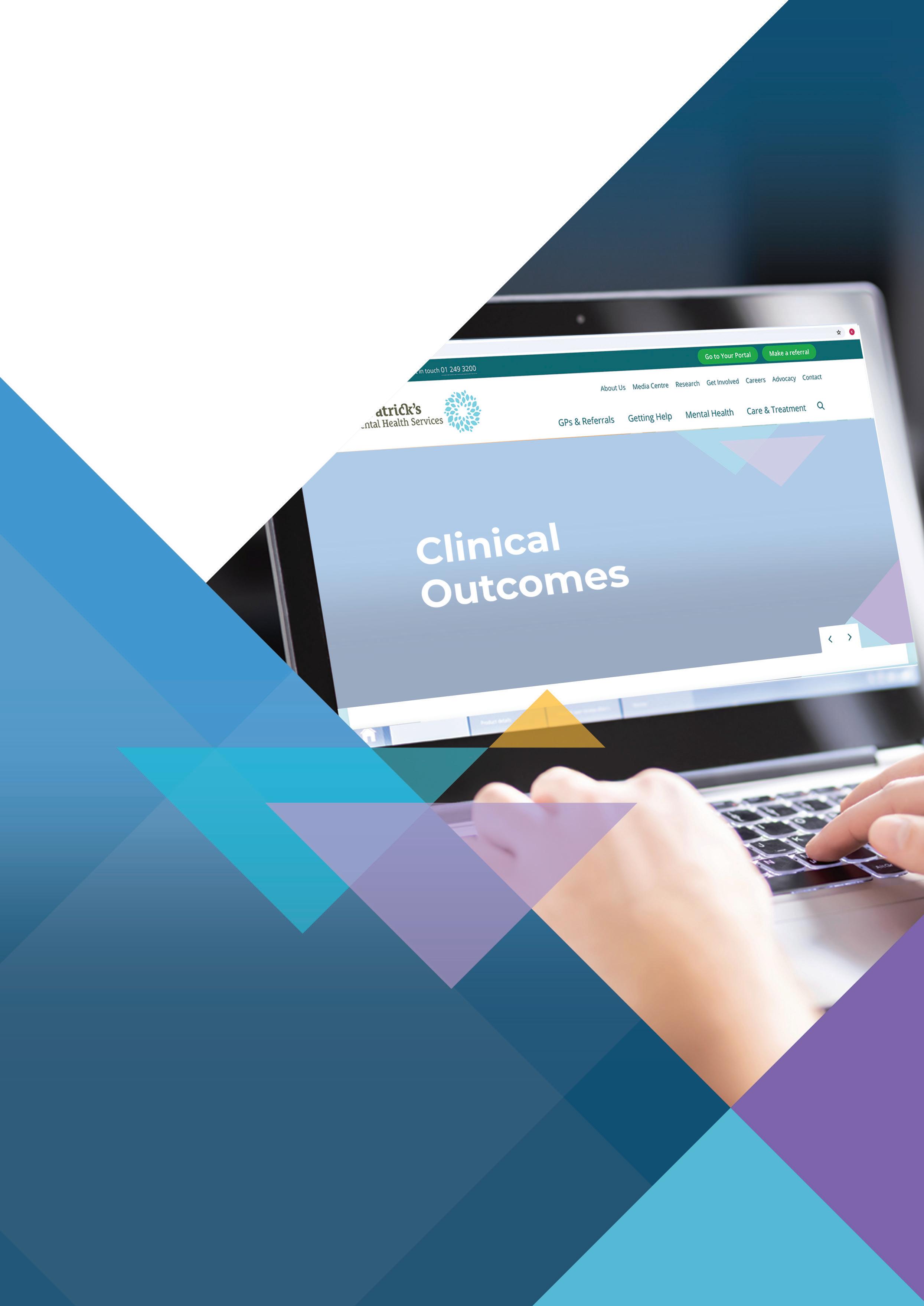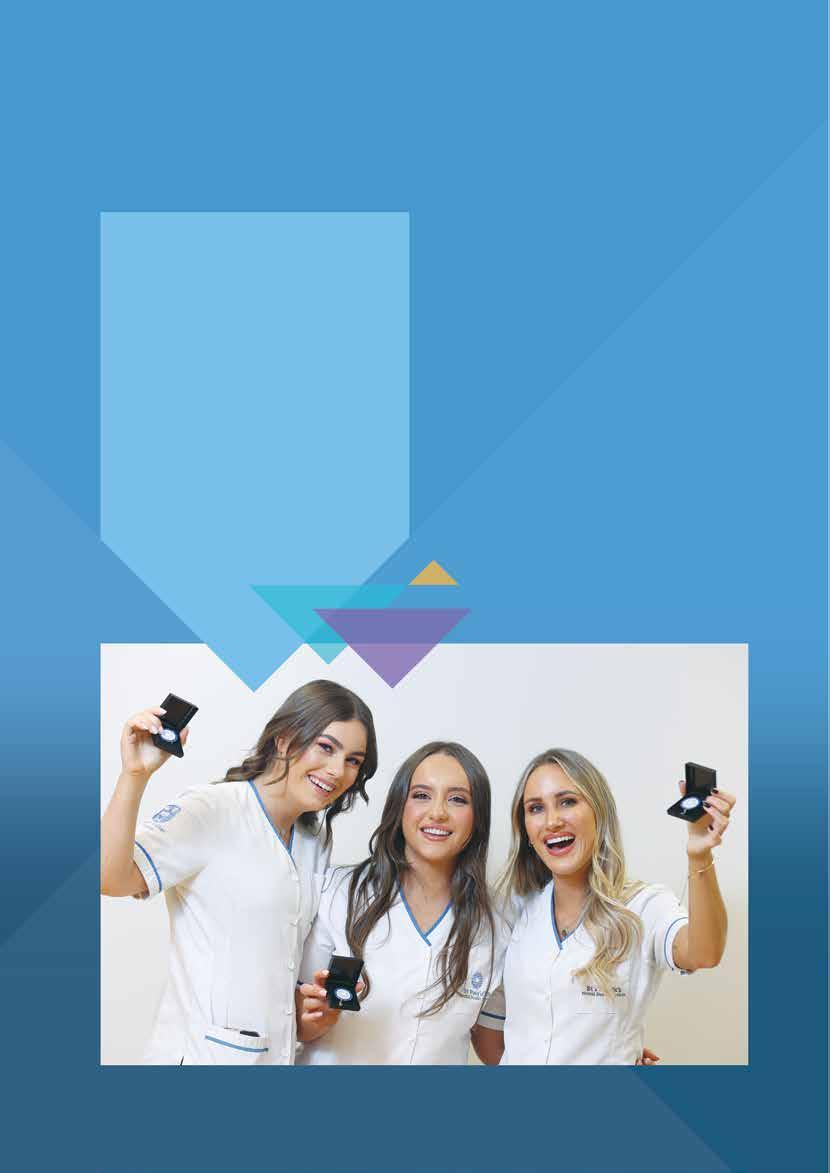

Introduction

Every year, St Patrick’s Mental Health Services (SPMHS) publishes an Outcomes Report relating to clinical care pathways, clinical governance processes, clinical programmes and Service User Experience Surveys. This summary provides some highlights in relation to analysis of the clinical outcomes for services provided by SPMHS in 2023.
The comprehensive Outcomes Report is the thirteenth of its type published by SPMHS and is central to the organisation’s promotion of excellence in mental healthcare. By measuring and publishing outcomes of the services we provide, we strive to understand what we do well and what we need to continue to improve.
In March 2020, in response to the COVID-19 pandemic, SPMHS introduced remote access to care, including the establishment of a new Homecare service, and remote care has since become integrated and central to our core service delivery model. During 2023, remote care continued to be offered across the organisation via the Homecare service, day programmes and the outpatient, community-based Dean Clinics, based on a service user’s assessment of needs. While our provision of technology-enabled care continues to expand, in-person mental healthcare and treatment remains the cornerstone of clinical activities within SPMHS.
St Patrick’s Mental Health Services
2023 nursing graduates

Clinical outcomes
Clinical Global Impression and Children’s Global Impression Scales
The Clinical Global Impressions Scale (CGI) is a clinician-rated mental health assessment tool used to establish the severity of illness at point of assessment (CGIS) and global improvement or change scored following care, treatment or intervention (CGIC). The CGIS is rated on a 7-point scale, with the severity of illness scale rated from 1 (normal) through to 7 (most severely ill). CGIC scores range from 1 (very much improved) through to 7 (very much worse).
The Children’s Global Assessment Scale (CGAS) is used in our child and adolescent services, and it provides a global measure of level of functioning in children and adolescents, scored by the multidisciplinary team MDT on a scale of 1 to 100, which reflects the individual’s overall functioning level. CGIC – Final global
or
(Adult inpatient service)
CGAS - Baseline and Final Assessment Scales (Willow Grove Adolescent Unit)
Children’s Global Assessment Scale
Alcohol and Chemical Dependency and Dual Diagnosis: Programme outcomes
The Alcohol and Chemical Dependency Programme (ACDP) is designed to support individuals with alcohol and/or chemical dependency or abuse to achieve abstinence by enabling them to develop an increased awareness of the implications and consequences of their drinking or drug-taking. The ‘staged’ recovery programme is delivered by psychiatrists, addiction counsellors and ward-based nursing staff, with input from other disciplines including psychology, social work and occupational therapy.
The Dual Diagnosis Programme is designed for adults with a dependency on alcohol or chemical substances, and in addition, who have a co-morbid diagnosis of a mental health difficulty such as depression, anxiety or bipolar disorder. The aim of this programme is to enable service users to not only achieve abstinence and recovery in relation to substance use, but also to facilitate awareness, understanding and provide practical support and knowledge in relation to their mental health difficulties.
Since 2014, both the ACDP and Dual Diagnosis programmes have used the Leeds Dependence Questionnaire (LDQ) to measure the clinical outcomes of these multidisciplinary stepped care programmes. The LDQ is a 10-item questionnaire, designed to screen for mild to severe psychological dependency on a variety of different substances, including alcohol and opiates. This measure was completed by service users pre and postprogramme participation, and showed significant improvements in service users’ mean scores following completion for both programmes.
Total scores on Leeds Dependency Questionnaire 2023
Addiction and Chemical Dependency Programme: LDQ mean scores

Note: Higher scores indicate greater dependency
Dual Diagnosis Programme: LDQ mean
Group Radical Openness Programme:
Clinical outcomes
Group Radical Openness (GRO) is a transdiagnostic group therapy intervention for service users presenting with mental health difficulties associated with costly and harmful overcontrol. GRO was developed in SPMHS. Overcontrol, sometimes referred to as too much self-control, underlies a range of mental health difficulties. This includes depression, anxiety, certain eating difficulties, obsessive compulsive personality difficulties and avoidant personality difficulties.
GRO is a structured group therapy approach. In GRO, the participants work on three core themes of overcontrol; distance in relationships, rigidity and inhibited emotion. The therapeutic process facilitates developing understanding, awareness and insight into each individual’s struggles with overcontrol. Safety is core to the treatment, and through a series of experiential exercises, the group work through ways to develop more intimate and connected relationships, develop more flexibility in their lives, and experience and express their emotions. GRO consists of 27 sessions and is delivered over a five-month period. It occurs twice per week for 12 weeks and then once per week for the final three weeks.
The graphs, right, show the results from the two core measures pre and post-completion of the GRO programme for participants in 2023. The first measure is the Five Factor Obsessive Compulsive Inventory - Short Form (FFOCI-SF). The FFOCI-SF is a 48-item self-report questionnaire that explores traits of obsessive-compulsive personality disorder (OCDP) that are associated with overcontrol. Higher scores indicate greater identification with overcontrolled traits. This report focuses on total scores of the FFOCI-SF to determine overall levels of overcontrol. It is important to note that the FFOCI-SF is a trait measure, and it is often harder to change lifelong psychological traits. However, our results have consistently shown significant improvements in this measure with large effect sizes. This suggests that GRO effectively targets difficulties with overcontrol.
The second primary measure is the Brief symptom Inventory (BSI). The BSI is a 53-item scale that measures symptoms of psychological distress. Psychometric evaluations have shown that the BSI is a reliable and valid questionnaire.
The Global Severity Index score (total score) is used in this report. The Global Severity Index score is the best indicator of current distress levels. Higher scores indicate greater psychological distress and difficulties. Our results found significant improvements (with large effect sizes) in overall psychological wellbeing for service users who attended GRO.
Total scores (pre and post-group) of Five Factor Obsessive Compulsive Inventory - Short Form (FFOCI-SF)
Total mean scores: Five Factor Obsessive Compulsory Inventory

Note: Higher scores indicate greater identification with overcontrolled traits.
Total scores (pre and post-group) of the Brief Symptom Inventory (BSI)
Total mean scores: Brief Symptom InventoryGlobal Severity Index
Note: Higher scores indicate greater psychological distress.
Dialectical Behaviour Therapy Programme: Clinical outcomes
The Dialectical Behaviour Therapy (DBT) programme aims to teach emotional regulation, distress tolerance, mindfulness and interpersonal effectiveness skills for individuals who experience out of control behaviour in the context of ‘emotional dysregulation’. DBT is a multimodal staged psychotherapeutic approach. The DBT programme at SPMHS is a Stage 1 DBT programme, with a focus on learning skills aimed at increasing behavioural control, focusing on moving from out-of-control behaviour to behaviour control in the context of high-intensity emotions. Service users’ behaviours determine the stage of treatment, and this determination is done via assessment (not just based on reports of diagnostic status).
DBT Stage 1 targets life-threatening behaviours, severe therapy-interfering behaviours and severe quality of life-interfering behaviours. SPMHS delivers two streams of the DBT programme; the ‘Comprehensive’ DBT stream consists of four DBT modes (skills training, one-to-one therapy, phone coaching and weekly therapist consultation team meetings). The ‘Skills Only’ stream seeks to support individuals with emotional and ‘behavioural dyscontrol’ who do not have a recent history of suicidal behaviour or deliberate self-harm. Both streams consist of 24 group sessions over a three-month period, and eight one-to-one sessions are offered during the ‘Comprehensive’ stream.
The three outcome measures for this programme were the Difficulties in Emotion Regulation Scale (which assesses emotion dysregulation), the Five Facet Mindfulness Questionnaire (which measures five aspects of mindfulness – observing, describing, acting with awareness, non-judging and non-reactivity) and the Ways of Coping Checklist (measuring the thoughts and acts that people use to deal with the internal and/or external demands of specific stressful encounters). Significant improvements were observed in use of mindfulness, coping styles and emotion regulation. The graphs, right, show the results for the DBT programme.
Difficulties in Emotion Regulation Scale
Total scores 2023
Total DERS scores

Note: Higher scores indicate greater difficulties with emotional regulation.
Five Facets Mindfulness Questionnaire
Total scores 2023
Total FFMQ scores
Note:
Ways of Coping Checklist
Mindfulness Programme: Clinical outcomes
The Mindfulness Programme provides eight weekly group training sessions in mindful awareness. The course is offered online in the evenings to accommodate service users unable to attend during the day. The group is facilitated by staff trained with Level 1 Teacher Training in Mindfulness from Bangor University, Wales. The programme aims to introduce service users to the practice of mindfulness for stress reduction through group discussion and experiential practices. The programme aims to help service users develop the ability to pay attention to the moment and to be more aware of thoughts, feelings and sensations in a non-judgemental way. Developing and practising this non-judgemental awareness has been found to reduce psychological distress and prevent relapse of some mental ill-health experiences. The outcome measure used by the Mindfulness Programme is the Five Facet Mindfulness Questionnaire (FFMQ). The FFMQ, assesses the tendency to be mindful in daily life, including five specific facets of mindfulness: observing, describing, acting with awareness, non-reactivity to inner experience and non-judging of inner experience.
In line with the 2022 report, analysis revealed a significant increase in total scores on the FFMQ from pre-intervention to post-intervention. This indicates that the programme continues to be successful in helping service users develop their capacity for mindfulness in daily life.
Five Facet Mindfulness Scale mean total scores pre and post-intervention FFMQ mean score differences

Note: Higher scores indicative of greater mindfulness.
Service users’ feedback

Those who completed and returned the Service User Experience Survey within our adult inpatient services and the Homecare service demonstrated a high level of satisfaction with the care they received.
Respondents’ ratings of care and treatment and overall experience of SPMHS (1 = lowest, 10 = highest).
Inpatient services
Homecare services
Report strengths
St Patrick’s Mental Health Services continues to lead by example in providing a detailed insight into service accessibility, efficacy of clinical programmes and service user experience. Reporting this breadth of routinely collected clinical outcomes demonstrates a willingness to constantly re-evaluate the efficacy of clinical programmes and services in an open and transparent way. A detailed Service User Experience Survey, encompassing all services within SPMHS, is now well established, reinforcing the organisation’s commitment to service user-centred care and treatment.
In 2023, through changes in processes, significant improvements were made in the overall Service User Experience Survey response rates, including increased focus on access to technologyenabled surveys. The results presented in this annual Outcomes Report are reflective of the achievement of excellent levels of compliance in the 2023 Mental Health Commission inspections.
The organisation delivered a full and comprehensive Outcomes Report in 2023, demonstrating the commitment of all SPMHS staff to continuously measure and improve our services. In keeping with efforts to expand the number of services incorporated into this report, two additional programmes were added to the this year’s report; The Building Healthy Self Esteem Programme and the Compassion-Focused Therapy for Older Adults Programme.
Technology-enabled care continues to be an effective option for clinical service delivery and in providing access and convenience to service users.

Report challenges
St Patrick’s Mental Health Services continues in its efforts to expand the number of services included within the Outcomes Report, but as yet we do not have all areas of service delivery included. Efforts to benchmark the results of this report remain very difficult as there is no access to comparible reports.
In order to best capture the efficacy of clinical programmes and services, there have been changes in the outcome measures used, which can create difficulties when comparing results to previous reports. The report’s clinical outcome results cannot be solely attributed to the service or intervention being measured and are not developed to the standard of randomised control trials.

